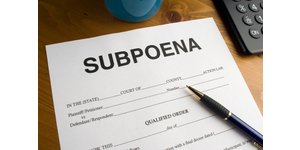In February 2021, the D.C. Bar Association published a legal ethics opinion about whether a lawyer’s representation of a “Prospective Client” when responding to a third-party subpoena seeking information about a lawyer’s existing or former client creates a conflict of interest. The opinion considers the following hypothetical situation:
In this opinion, the Committee considers whether a lawyer’s representation of a client in responding to a third-party subpoena for Information that identifies specific parties by name (the “Prospective Client”) creates a conflict of interest if the lawyer also represents or represented one of the named persons (the “Other Client”) in unrelated matters.
See D.C. Bar Legal Ethics Opinion 831 (2021).

According to Opinion 831, typically a lawyer may represent the Prospective Client, even if the Information sought relates to another client of the lawyer, without triggering a conflict under Rule 1.7(b).[1] See D.C. Bar Legal Ethics Opinion 831 (2021). A conflict of interest may arise, however, if the representation would adversely affect, or be adversely affected by, the representation of another client or personal interests of the lawyer. A lawyer need not explore every speculative hypothetical that could possibly arise in the representation. On the contrary, Ethics Opinion 381 opines that lawyers need “only to determine, based upon a reasonable objective belief, that certain facts will develop that would create a substantial risk that the lawyer’s representation of a client will adversely affect or be adversely affected by ethical obligations to another client, former client, or herself.” See D.C. Bar Legal Ethics Opinion 381 at 439.
If the lawyer undertakes the representation of the Prospective Client, a conflict of interest may arise after the representation commences if the lawyer’s discovery of potentially damaging information, prior to its production, might adversely affect the lawyer’s ability to competently and diligently represent either the Prospective Client or the Other Client. Under such circumstances, continuing to represent the Prospective Client might adversely affect, or be adversely affected by, representation of the Other Client. Or, the lawyer might conclude that there is a personal conflict pursuant to Rule 1.7(b)(4) because the lawyer’s professional judgment on behalf of the subpoenaed client will be or reasonably may be adversely affected by her responsibilities to a third party or by her own interests. Whether continuing the Prospective Client representation is a conflict of interest under the Rules of Professional Responsibility is a matter of degree and a question of fact, which turns on whether a reasonable lawyer would conclude that there would be a diminution in the quality of the representation of either the Prospective Client or the Other Client.
[1] Note that Louisiana Rules of Professional Conduct Rule 1.7(b) differs slightly from the D.C. Rule. See L. Rule Pro’f Conduct, r. 1.7(b).
